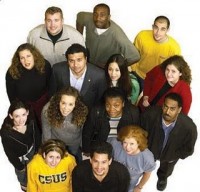 Daniel Goleman in his groundbreaking book “Working with Emotional Intelligence” might have said it best: “We are being judged by a new yardstick; not just how smart we are, or by our training and expertise, but also by how we handle ourselves and each other”. Times have certainly changed. I think there has been a dramatic shift in people’s attitudes. Their wants and needs are changing. For the first time in our lifetime we have the potential of working with 4 different generations in the same workplace at the same time. Each generation communicates and interacts differently and want to be managed and manage differently. Each generation have a different set of values and career aspirations. For the newest generation – the Millennials – life outside of work is just as important, if not more important, then life inside work. Each generation is motivated by different things. What you need to decide now is – will the management style that got you here – be the same style that will sustain you or get you to where you need to go? Is one style of managing and leading others good enough?
Daniel Goleman in his groundbreaking book “Working with Emotional Intelligence” might have said it best: “We are being judged by a new yardstick; not just how smart we are, or by our training and expertise, but also by how we handle ourselves and each other”. Times have certainly changed. I think there has been a dramatic shift in people’s attitudes. Their wants and needs are changing. For the first time in our lifetime we have the potential of working with 4 different generations in the same workplace at the same time. Each generation communicates and interacts differently and want to be managed and manage differently. Each generation have a different set of values and career aspirations. For the newest generation – the Millennials – life outside of work is just as important, if not more important, then life inside work. Each generation is motivated by different things. What you need to decide now is – will the management style that got you here – be the same style that will sustain you or get you to where you need to go? Is one style of managing and leading others good enough?
Worth Remembering … “The definition of insanity is doing the same thing – expecting a different result” – Albert Einstein
Productivity is still the name of the game and that will never change. One of your roles as a manager or leader has always been to minimize the input and maximize the output. In today’s ever-changing, competitive global marketplace you need to produce more with less. Your survival and your company’s survival demands it. To accomplish both – managers and leaders must change from being task-focused to being people-focused. People like to work with people they like. People like to feel wanted. People like to feel that they are appreciated and respected.
Worth Remembering … “One of the most important things about being a good manager is to rule with a heart. You have to know the business, but you also have to know what’s at the heart of every business and that’s people”. – Oprah Winfrey
Technical skills are important but, for the most part, you can get that out of a book or Google it. What is needed to be successful managing and leading others in the 21st Century are soft-skills, sometimes referred to as people skills. Successful managers and leaders will be those who have developed great soft-skills for a hard place. Successful managers and business leaders are F.O.C.U.S.E.D. (C) on their most important asset – their people.
Friendly: Someone who can smile and say hello. Someone who can make the other person feel important.
Observant: Someone who can recognize those that need help and those that don’t. Someone who will get out of their way and let them do the job.
Consistent: Some who is consistent in the way that they apply policies and procedures. Consistent in the way they treat people and deal with situations.
Understanding: Someone who tries to see things from the other person’s point of view. Empathy is a valuable 21st Century skill to have.
Sincere: Someone who truly wants their people to be successful at what they do. Managing and leading others is a team sport – create win-wins.
Energized: Someone who is enthusiastic. Someone who looks and acts like they want to be there.
Dependable: Someone whose word they can depend on. Someone they can trust. If they can’t trust your word they won’t trust you.
Are you F.O.C.U.S.E.D.? 🙂
Copyright (c) 2013. Brian Smith-PLD. Brian is the author of “Confessions of a Reformed Control Freak – The Top Ten Sins Most Managers Make & How to Avoid Them”. Looking for a speaker? Planning a lunch-n-learn or organizing a workshop? Contact Brian. briansmithpld@gmail.com

You must be logged in to post a comment.